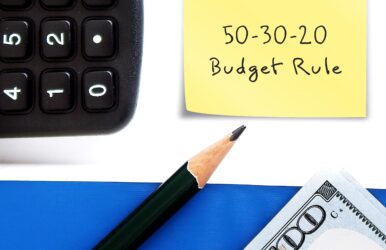Online banking offers convenience and flexibility, allowing you to manage your finances with just a few clicks. However, it also
Credit Score Myths: What Really Affects Your Credit Score
Your credit score is one of the most important numbers in your financial life, impacting everything from loan approvals to interest rates. Yet, many myths and misconceptions surround it. These misunderstandings can lead to financial decisions that harm your credit score or leave you unnecessarily worried.
In this blog post, we’ll debunk some of the most common credit score myths and provide clarity on what truly affects your score.

1. Checking Your Credit Score Lowers It
Myth: Every time you check your own credit score, it will drop.
Reality: This is a major misconception. Checking your own credit score is considered a “soft inquiry” and does not impact your score at all. You’re allowed to monitor your score as often as you like without penalty.
However, hard inquiries, which occur when a lender checks your credit as part of an application for a loan or credit card, can affect your score. These inquiries usually cause a slight, temporary dip, but they are only significant if you apply for multiple credit accounts in a short period.
Tip: Regularly check your score to stay on top of it, especially before making large financial decisions.
2. Closing Old Credit Cards Improves Your Score
Myth: Closing an old, unused credit card will help improve your credit score.
Reality: Closing an old credit card can actually hurt your score. Here’s why:
- Credit Utilisation Ratio: This ratio is the amount of credit you’re using versus your total available credit. If you close a credit card, your available credit decreases, which could increase your credit utilisation ratio and negatively impact your score.
- Credit History Length: The length of your credit history makes up about 15% of your credit score. Closing old accounts reduces the average age of your credit accounts, which can hurt your score, especially if the card you close is one of your oldest.
Tip: Keep old accounts open, even if you don’t use them. If you’re worried about annual fees, try asking the issuer to waive them or switch to a no-fee version.
3. You Need a Perfect Credit Score to Get a Loan
Myth: You need a perfect (850) credit score to get approved for loans or credit cards.
Reality: While a perfect score is rare and impressive, you don’t need one to be approved for credit. In fact, most lenders consider scores in the 700-750 range to be excellent, and even scores in the 600s can qualify you for loans—though with higher interest rates.
Lenders look at your score as part of a broader picture, which includes your income, debt-to-income ratio, and overall financial stability. So, while a higher credit score can secure you better rates, you don’t need perfection to secure financing.
Tip: Aim for a score of 700 or higher for the best rates, but don’t stress if it’s not perfect.
4. Carrying a Balance Helps Your Credit Score
Myth: Carrying a balance on your credit card will improve your credit score.
Reality: This is a common myth, but it’s incorrect. Paying your credit card balance in full every month is the best way to avoid interest and keep your credit utilisation low, both of which positively impact your credit score.
The myth likely stems from the fact that credit scoring models, like FICO, consider credit utilisation as one of the biggest factors in your score. But carrying a balance on your card, especially one that accrues interest, can make it harder to keep your utilisation ratio low, ultimately harming your score.
Tip: Pay off your balance in full each month to avoid interest and boost your credit score.
5. All Debts Are Treated Equally
Myth: All types of debt are viewed the same by credit bureaus.
Reality: Not all debts impact your credit score equally. For example, instalment loans (like mortgages or car loans) and revolving credit (like credit cards) are weighed differently by credit scoring models.
Credit card debt, which is revolving, can negatively affect your score if it increases your credit utilisation ratio. However, paying off instalment loans like mortgages or student loans over time can have a positive effect because they demonstrate your ability to manage long-term debt.
Also, some debts, like medical bills, may not be reported to credit bureaus unless they go into collections, and even then, the impact might be less severe than other types of debt.
Tip: Focus on paying off high-interest revolving credit first, and keep an eye on your credit utilisation ratio.
6. Your Partner’s Credit Score Affects Yours
Myth: If you’re married or living with someone, their credit score affects yours.
Reality: While your spouse’s credit score does not directly affect yours, joint accounts—such as a joint credit card, mortgage, or car loan—can influence both of your scores. If your partner misses payments, it could negatively affect your score, and vice versa.
If you’re applying for credit together, both of your credit scores will be taken into account by the lender. However, if you have separate accounts, your scores are not directly tied to each other.
Tip: If you and your partner have different credit scores, consider applying for credit in your own name if possible. Keep an eye on any joint accounts to ensure that payments are made on time.
7. Bankruptcies and Negative Marks Stay on Your Credit Forever
Myth: A bankruptcy or negative mark stays on your credit forever.
Reality: Bankruptcies and other major negative marks, such as late payments or collections, do stay on your credit report for several years (typically seven to ten years), but they don’t last forever.
As time passes, the impact of these negative marks diminishes. Additionally, if you maintain good credit behaviour after a bankruptcy or other setback, your score can improve over time. It’s also important to note that some scoring models weigh recent credit events more heavily than older ones.
Tip: Focus on rebuilding your credit after a major setback by paying bills on time, reducing your credit utilisation, and avoiding new negative marks.
Understanding the facts about what truly affects your credit score is essential for making informed financial decisions. By debunking these myths, you can focus on strategies that actually improve your credit standing, from keeping credit card balances low to monitoring your credit report regularly.
Remember, your credit score is not a fixed number; it’s a reflection of how responsibly you manage credit over time. With the right actions, you can maintain or improve your credit score, giving you more financial freedom and opportunities down the road.


